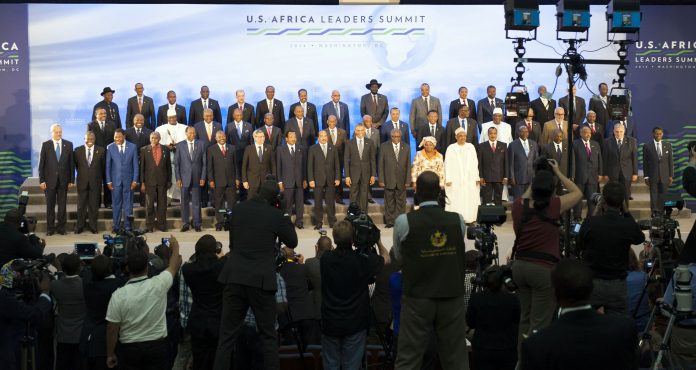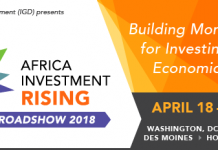In his book, Achievement As Value in Igbo/African Identity: The Ethics, Nigerian author Vernantius Emeka Ndukaihe describes the art of dialogue and conversation as a “cherished value” in African human relations. “People freely discuss their problems and look for suggestions and solutions together. The unwillingness to talk to people about either private or public affairs can be interpreted as bad manners or a sign of enmity,” he writes.
This is a fitting lens through which to view the U.S.-Africa Leaders Summit that brought nearly all of Africa’s presidents, prime ministers, and top echelon of its private sector to Washington, D.C., in August. There are problems in U.S.-Africa relations and the president of the United States invited Africa’s political and business leaders to his home to discuss them. It was “a chance to truly listen and to try to come together around some pragmatic steps that we can take together,” President Obama said.
Africans are dismayed that a U.S. president whose father is Kenyan appears to be less committed to Africa than his predecessors. Less than 1 percent of U.S. foreign direct investment goes to Africa, whereas China invests 3.4 percent of its FDI in the continent. Beyond oil and mining, the American business presence in Africa is practically nonexistent.
Africans contend that the United States focuses on the wrong issues—terrorism, gay rights, governance—and that its media consistently paint a negative picture of the continent, ignoring strides made by countries such as Nigeria, Rwanda, Mozambique, and Tanzania in favor of stories that focus on terrorism, disease and corruption. They suspect that Americans look upon Africa with contempt. Why, some have asked, should almost all of Africa’s leadership be uprooted to Washington to hear the U.S. president announce $37 billion in “new” money for the continent, dine at the White House and pose for a group photo with President Obama? It took Obama six years into his presidency to convene this summit and when he did, he held not a single one-on-one meeting with an African head of state.
U.S. media focus on Israel-Palestine, Ukraine-Russia, immigration reform and other U.S. domestic policy issues at President Obama’s post-summit press conference reinforced the perception of contempt for Africa. Some are even suspicious of the motives for President Obama’s Young African Leaders Initiative, which brings hundreds of the continent’s most dynamic young achievers to the United States for six weeks each year for a pep talk by the president and leadership training and mentoring at top U.S. universities. Critics see this as an attempt to “brainwash” young Africans into an American way of thinking.
For the U.S. part, Africans are too quick to dismiss genuine American concerns about the rule of law, open and accountable institutions, strong civil societies, and protection of human rights; the risks of doing business with Africa; reforms to attract investment, reduce barriers to trade, and promote regional integration; and building human capacity.
Americans contend, too, that Africans fail to understand President Obama’s approach to their continent—an approach grounded in his long-held belief “that the security and prosperity and justice that we seek in the world cannot be achieved without a strong and prosperous and self-reliant Africa.” Obama’s key Africa initiatives to date—Power Africa, Trade Africa, and the Young African Leaders Initiative—demonstrate his commitment to improving the continent’s capacity to grow economically and become “strong and prosperous and self-reliant.”
It is facile to deride the summit as a waste of time and money, an insult to Africa, and grandstanding by President Obama. One U.S. news outlet even described it as “a rogue’s gallery,” citing the presence of heads of state with questionable human rights records, including Blaise Compaore, president of Burkina Faso; Yahya Jammeh of Gambia, president of Gambia; Salva Kiir, president of South Sudan; and Teodoro Obiang Nguema Mbasogo, president of Equatorial Guinea.
On the scene in Washington, I observed and talked with Africans and Americans alike. Africans did not genuflect in Washington. Instead, they came to learn and to deliver sharp messages to their hosts. President Obama and U.S. CEOs spoke their mind about the risks of investing in Africa; groundwork was laid for further dialogue and for deals between U.S. and African small and medium-sized businesses; U.S. SMEs connected with U.S. agencies that facilitate trade with and investment in Africa.
“A very important thing happened at this summit,” Mamadou Konate, president of Mali Chamber of Commerce and Industries, told me. “We now know the spirit of the American businessman. We are now able to better plan how to engage American business, how to do business with America. Here, the public sector is pushing the private sector. In France and Francophone Africa, it is the dictatorship of the public sector.”
What happens next in relations between the United States and Africa will determine the success or failure of the U.S.-Africa Leaders Summit. Through the lens of the cherished value of dialogue, however, its success seems sealed.
“Years from now, people will look at this summit and say it was an historic moment,” Philip W. Bennet, Of Counsel at the global energy law firm Mogel & Sweet, said.













